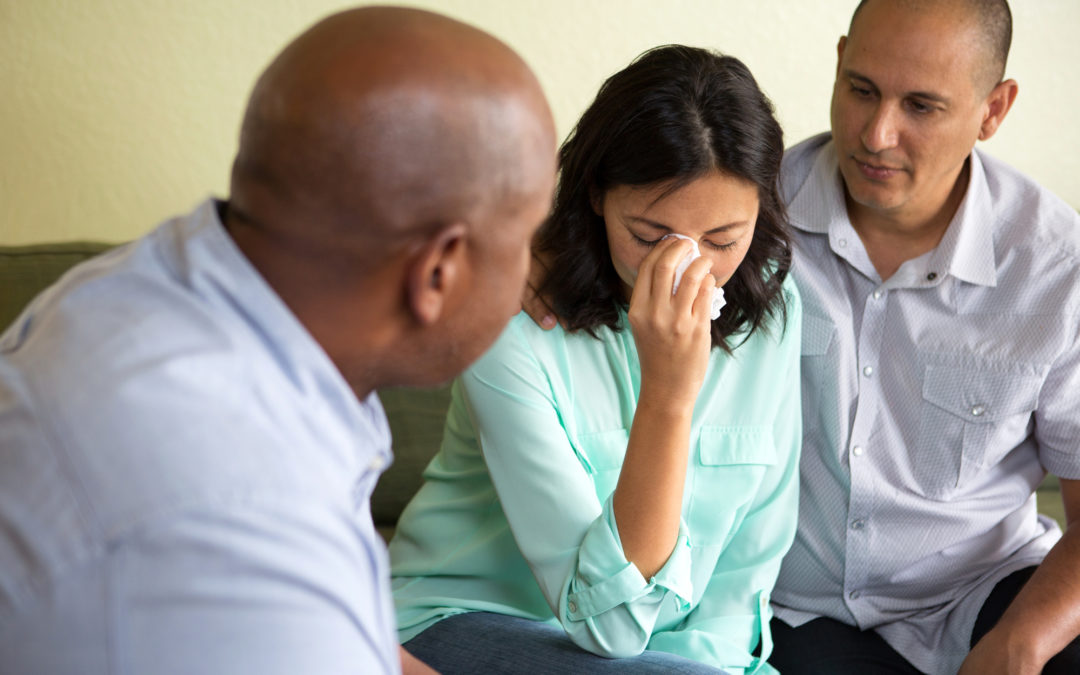
by Willow Oak Therapy Center | Jul 15, 2021 | Couples Counseling
According to the American Psychological Association, couples counseling is more than 75% effective. If you are considering marriage therapy, this statistic proves benefits that many couples already know. Professional counseling works.
But, marriage therapy isn’t only intended for couples on the brink of divorce. Whether you are newlywed or just celebrated an anniversary milestone, each chapter of your life presents new challenges and events. Therefore, marriage therapy helps you reconnect, pinpoint your issues, and strengthen your bond for the future.
But how do you know when counseling is necessary? What are some tell-tale signs? Read on to learn everything you need to know.
Lack of Listening
You tell your partner about the long workday or share plans for the upcoming weekend. Did they hear you? Lack of listening is a common issue in many relationships.
But when simply not hearing turns into ignoring or lack of interest, this could indicate the need for counseling. This is particularly true if you have noticed a shift in your partner’s listening attention and interest or if you feel emotionally ignored in the current relationship.
Financial Stress
Are you struggling financially? Does your partner tend to overspend while you consistently save? These are common financial stressors that could affect the health of your marriage.
If you find yourself arguing or worrying about money frequently, you may benefit from marriage therapy. In relationships, money can reveal where we assign value. A therapist can help you understand where your partner is coming from and address the route stressor of your financial concerns and issues.
Poor Communication
Communication and listening go hand in hand. But strong communication skills are arguably one of the pillars for strong and lasting relationships.
If you and your partner are not communicating or lack steady communication, this could signal a need for marriage counseling. Poor communication comes in many forms and could impact each couple’s relationship in a different way.
For example, you may feel your partner doesn’t confide in you or tell you about the details of their day-to-day work or personal life. Or, you may feel conversations are one-sided and you are never able to express concerns, worries, or interests in conversation. Healthy communication is open, transparent, and honest.
Evaluating Communication Patterns and Behaviors
Communication is one of the most challenging aspects of a relationship. If you are struggling with poor communication, professionals like Willow Oak Therapy Center can help. They focus on the “client” as the couple.
And, the psychotherapy center will address communication patterns and help you better understand your reactions to stressors. This will help strengthen your personal communication skills and dialogue as a couple.
Addiction
If you or your partner struggle with addiction, you could benefit from marriage counseling in addition to other forms of therapy or group work. Addiction has the power to destroy a person’s personal and professional life. But, this tragic circumstance can also wreak havoc on marriage and family life.
Couple’s therapy will help you develop the skills to tackle and overcome this addiction a couple. You may view your partner’s addiction as a calculated assault on your marriage.
Or, you may lack the emotional awareness to understand the deeper routed issues at hand. An experienced couples’ therapist will help you see each other beyond the addiction and learn to heal together.
Insecurity and Low Self-Esteem
While marriage therapy addresses the couple, an individual’s own insecurities and low self-esteem may affect the entire relationship. Whether you struggle with weight or worthiness, a couple’s therapist can help you sort through these issues. If unaddressed in your relationship, these emotional ruts can cause a larger divide and communication issues down the line.
Life Changes
As a couple, and as individuals, you may have experienced major life changes. For example, the birth of your children undoubtedly changed your family’s dynamic and future. Or perhaps, a job promotion or layoff impacted your financial outlook.
Or, a cross-country move could weigh heavily on your relationship. Life changes are emotional and could indicate the need for marriage therapy. If you are struggling to manage and overcome these changes together, you could benefit from the help of a professional.
Preparing for the Future
Instead of stressing over the future or lamenting the past, a therapist will help you work through these changes in the present moment. It is common during hard times to assign blame or withdraw.
A therapist will help you faces challenges together. This will strengthen your marriage bond and prepare you with a sharp set of tools to tackle any future issues.
Infidelity
Did you know that more than 40% of married couples have been affected by infidelity? If you struggle with infidelity in your marriage, know that you are not alone. Emotions around infidelity may include guilt, shame, anger, rage, and general unhappiness.
You may feel the need to lash out at your partner or blame yourself during these trying times. But, managing these emotions on your own can quickly become isolating and overwhelming. That’s where the professional guidance of marriage therapy can help.
A therapist will help you unpack these emotions and clearly communicate your feelings to one another. This will create a calm space to foster real growth and help build trust again.
Missing Intimacy
A lack or change in intimacy could indicate the need for marriage therapy. If you are no longer intimate with your partner or have noticed a shift in your intimate relations, there may be more serious issues beneath the surface.
And, intimacy is not just physical. Your relationship should also welcome emotional intimacy; this relates to strong communication habits.
Marriage Therapy Could Strengthen Your Relationship
If you are considering marriage therapy, you do not have to experience shame or feel alone. As couples evolve, they may grow apart or together. A marriage therapist will help you address your issues as individuals and as a couple so that you can continue to grow together if that is what you hope for.
These are some of the signs that could indicate issues in your relationship. If you have experienced any of these issues or have questions about marriage counseling, contact Willow Oak Therapy. The center will walk you through the intake process, address fees and insurance, and much more.

by Willow Oak Therapy Center | Jun 14, 2021 | Couples Counseling
Are you still hesitant about going to marriage counseling? Well, this might comfort you; according to the American Psychological Association, around 75% of couples who go to therapy see an improvement in their relationships afterward. Counseling isn’t only for couples who are on the brink of divorce. It can also be for those with milder struggles who want advice from a professional. Many advise couples to go to therapy even before they think they need it. Still not yet convinced? Here are some benefits of marriage counseling you can get.
Improve Your Communication
Many couples don’t know how to communicate effectively. The main reason is that each individual has different ways of communication.
Some people, for example, like facing issues head-on. Yet, others might prefer to ignore them instead. Certain issues might be a big deal to some yet a small matter to others.
This creates problems because both sides feel unheard and, sometimes, unloved. Marriage counseling helps you learn a communication style that works for both of you.
Communication is key in a successful relationship. Both sides have to learn how to express their feelings, thoughts, wants, and needs. Both sides have to learn how to listen, too.
You’ll learn how to communicate respectfully with each other from marriage counseling. This is why around 98% of couples are content with counseling. It gives you the tools you need for dealing with your marital problems.
Develop a Closer Relationship
In many cases, couples go to therapy because they’ve grown apart. All the conflicts they’ve had might have created space between them, creating more misunderstandings and mistrust.
Marriage counseling gives couples a good environment for communication. As you sort through your relationship problems, you may begin to feel like a team again. You can start building trust and creating more good memories again.
Laying yourself bare to your partner can help you become closer. You may begin reliving those feelings of closeness you once shared at the start of your marriage, especially if your therapist advises you to spend more time with each other.
Deepen Intimacy
One of the most underrated benefits of marriage counseling is increasing intimacy. It can either be emotional or physical intimacy.
Sex is an important part of a relationship because it ignites the passion you feel toward each other. The number of times you become intimate may dwindle over time. Still, you shouldn’t resign yourself to marriage without passion.
Marriage counseling can help you find out the cause of your lack of intimacy. It can then help you find ways to reignite your passion in your relationship.
Learn How to Compromise
Many conflicts are due to having different opinions and views on things. As you go on through marriage, you’ll encounter issues where you might not stand on the same side. It can be about parenting, politics, finances, or even smaller things like what color you should paint your interior wall.
Compromising is the answer to these issues. If you’re having issues in this aspect, counseling will help you with that.
Of course, you should have already worked out major issues that can break a marriage, like whether to have children or not, where to live, and whatnot. For other issues, you can still work through them; you only need to learn how.
Uncover the Root Cause
Marriage counseling doesn’t only look at the current conflict. It digs deeper into each individual to figure out the root cause of the conflict.
Our past still has a hold on our present. Our thoughts, behavior, and feelings are the consequences of our past. For some people, their past affects everything in their current life too much.
Intimacy issues, for example, might stem from an abusive childhood. Some marriage issues can be a product of one’s past.
Counseling can help you pinpoint what’s fueling these issues. Once you find out, you can then take the right steps to heal.
Heal Old Wounds
There’s no relationship wherein you have not hurt each other, whether intentionally or unconsciously. What matters, however, is how you overcome such instances as a couple.
That’s where some problems come in. One might still be hurting over an old wound, while the other is already way past it. That’s the deal with some wounds; they may remain to be painful even as time passes by.
Marriage counseling can help the couple work through these wounds together. When healing comes, the couple can move forward together with no one left behind in pain. A good therapist can help you leave your past issues, resentment, and anger in the past.
Set Priorities and Goals as a Couple
Another area that might create arguments is the set of priorities for each person. One person might be putting their partner as a top priority, while the other is focusing on their career.
When you go to counseling, you may have to discuss your priorities. Having different ones might be the cause of your many conflicts.
You’ll get a chance to examine your priorities as an individual and a couple. You can then choose to re-arrange them so you can be as one with your partner. But, if both of you have your relationship very low on the list, then you might want to re-examine your marriage instead.
Promote Self-Growth
More often than not, you have to grow as a person to meet the needs and demands of a successful marriage. Marriage counseling can help you with personal growth.
Even if the sessions focus on your relationship, you’ll also learn more about yourself at the same time as learning more about your partner. You’ll learn what skills you need to work on to improve your relationship, for example.
Some pieces of relationship advice you can get out of counseling can translate into other areas of your life, as well. You might realize that your overall life has improved aside from your relationship.
Get the Benefits of Marriage Counseling Now
One thing to remember is that both participants have to be willing to reap the benefits of marriage counseling. You must both put effort into understanding and communicating with each other. If one isn’t willing, then no amount of counseling will help.
Don’t worry; your partner might only need a little more time to prepare. When you’re ready to get counseling, feel free to contact us today.

by Willow Oak Therapy Center | May 3, 2021 | Couples Counseling
According to the American Association for Marriage and Family Therapy, there’s been a fifty-fold increase in qualified family and couples counselors since the 1970s.
More in-depth research, greater professional legitimacy, and less discrimination for couples seeking treatment have contributed to the field’s growth. Recent record-low divorce rates indicate that more people than ever before are accessing couples therapist services.
Whether you’re married or cohabitating, the issues faced and the need for help is often similar. As you and your partner start down the relationship therapy path, you will discover things about each other that will help you create positive change in your relationship.
Prepare yourselves for the challenging yet ultimately rewarding journey ahead. Review some of the questions you can expect from a couples therapy session.
1. Why Did You Choose to Undertake Couples Therapy?
In most cases, attending couples therapy requires the consent and agreement of both individuals in a relationship. However, each person may have their own reasons for agreeing to go to counseling.
Most people book a couples counseling meeting for the following reasons:
- Managing nontraditional partnerships
- Sexual problems
- Concerns over social media or digital technology use
- Unfaithfulness and trust issues
- Premarital therapy
- Family counseling (such as blended families)
A therapist will typically ask each of you to discuss these reasons because it highlights key issues you face in the partnership and your desire to stay in the relationship. If you didn’t want to go to couples therapy or feel forced into attending, it’s unlikely you see value in maintaining the relationship.
2. Do You Trust Your Partner?
While love, romance, laughter, and respect are all advantageous attributes in a relationship, the crucial factor for success is whether or not two people can trust each other. Trust may be eroded due to infidelity, addiction, dishonesty, unrealistic expectations, or other less logical causes.
Whatever the reason, the best couples therapist will ask you this particular question to establish whether this is an area that needs to be worked on.
Repairing a relationship damaged by a lack of trust takes considerable time. Displaying a desire to re-establish trust is an excellent first step, but your counselor will need to dig deep into the dynamics of your partnership. Be prepared for challenging questions and strategies designed to help you and your partner rebuild some common ground.
A loss of trust is cited as one of the core drivers of marriage breakup. Your therapist likely has a lot of experience dealing with this issue.
3. How Happy Do You Feel in this Relationship?
It’s not rocket science to work out that most people want to live a joyful life. One 2020 study of people from 42 countries showed that almost 70 percent of respondents rated happiness as “extremely important.”
But what does being happy mean in the context of a relationship? According to the same report, it meant everything from stability, pleasantness, and safety to material wealth, comfort, and psychological well-being. Happiness, it seems, is subjective, so the answers to this typical therapy question tend to vary wildly from person to person.
Your therapist will explore your respective levels of happiness in your partnership to determine your reasons for wanting to stay together. Are you codependent–relying on one another in an unhealthy way? Perhaps you remain together simply because you’re too scared to leave the comfort of something familiar.
But in the best cases, a couple may rekindle that ember of happiness they felt when they first got together and explore ways to help it burn bright once again.
4. Where Do You See Your Relationship In the Future?
It’s essential to understand whether you see eye to eye on your future or if you see any future at all. Even if your goals align, you must want to achieve those aims in tandem. A couples counselor will help you recognize your position and create strategies to work towards your desired future.
Your therapist might also ask you to use a weather metaphor to describe your relationship, something like “What is your forecast for the future?” Do you see your relationship as a sunny day or a cloudy one? Or is there a tornado on the way?
These kinds of questions couch a serious subject within a more approachable one. Your answers will allow your counselor to predict the extent of the damage inflicted on your partnership and how easily you see it repaired. As with the weather, there’s always the chance of sunshine as each new day dawns.
5. What Do You Wish Your Partner Did More?
A lack of communication is cited as one of the leading causes of conflict in couples. Often this lack of communication is exacerbated by one or both members of a couple not feeling satisfied with the other’s level of participation.
Often what people think of is “nagging,” neediness or anger is a way, albeit ineffective, of an attempt to communicate those wishes. Your therapist will ask key relationship questions to help you to express your desires in a non-judgemental, safe space. And your partner is far less likely to put up barriers or respond habitually.
6. Are Your Expectations for Intimacy Being Satisfied?
Relationship issues are sometimes the result of a mismatch in each partner’s levels or type of intimacy. Does your partner always say no when you ask for sex? Do the experiences that turn them on something you find unappealing?
Both people in a relationship are entitled to satisfaction, both romantically and sexually. Sexual incompatibility can lead to frustration, arguments, and tension, whereas an in-sync sex life is emotionally satisfying and has numerous health benefits.
Your therapist will explore reasons for any mismatch. They will give you and your partner the chance to discuss your feelings to harmonize your sex life.
Choosing a Couples Therapist For Your Situation
An experienced couples therapist can help you and your partner redefine your reasons for being together. It’s a valuable option for couples with a wide range of issues: from recovering from cheating to building better communication strategies and everything in-between. Finding a clinic you can count on is the first step to regaining that lost trust and love.
Are you Googling “couples therapist near me” due to relationship hardship? Contact Willow Oak Therapy today to discuss whether a session is the right step for you and your partner.

by Willow Oak Therapy Center | Jan 7, 2021 | Couples Counseling
Are you having relationship troubles?
Fighting and arguments are inevitable when you’re in a relationship. Psychologists state that fighting with your partner is normal. Many will consider it a sign of a healthy relationship.
However, there is a difference between healthy and unhealthy fighting. Like 69% of married couples, many fights often go unresolved. This creates a chasm in the relationship that often leads to splitting up.
Couples fight for a variety of reasons, from money to personal issues. If you’re having relationship problems, consider the benefits of couples therapy. In this article, we cover some advantages of couples therapy when fights don’t seem to resolve.
1. Commitment to Growth
Going to couples therapy may be a big decision between you and your partner. Many couples avoid couples therapy because of the stigma that revolves around it. Many people think that marriage therapy is a sign of a failed relationship.
In fact, going to couples therapy is a sign that you’re willing to commit to growth. Investing in your relationship allows you to pave the path for a happy and healthy marriage. Asking for help from a professional marriage counselor can be a huge step in a relationship.
Going to couples therapy holds you accountable for your actions in the relationship. For couples therapy to work, you need to put the things you’ve learned into practice. This requires discipline and commitment.
2. Reveals Patterns and Issues
One of the benefits of couples therapy is that it not only helps you solve problems. A marriage counselor can help you identify what the root issues are. In some cases, couples therapy allows you to reveal issues before they set in.
Your therapist does not only focus on what you argue about. A professional couples therapist will also take note of how you interact. How you argue with your partner is essential to your relationship.
Going to couples therapy can be an eye-opening experience. It can reveal how you and your partner handle things as a couple.
3. Improve Communication
Improving your communication skills is one of the best reasons to go to couples therapy. Improving communication with your partner is key to a healthier relationship. Good communication skills do not only rely on your articulation of thoughts.
Being a good and active listener and empathy are crucial to good communication. You must also learn to avoid personal attacks even when in conflict with your partner. Meaningful conversations can help you deepen your connection and intimacy.
Communication is one of the main causes of conflict between couples. Often, when couples fight, they don’t engage with each other at all. This can lead to distancing and isolation that makes you drift apart.
Couples therapy allows you to fix the gap between you and your partner. It does not only make you a better communicator. It can also help you feel listened to and heard by your partner.
4. Navigating Parenthood
Relationship problems can be harder when there’s a child involved. Family dynamics can change in a family, depending on the parents. One of the benefits of couples therapy is that you learn to become better parents together.
Many parents tend to develop their own parenting strategies. The differences in dealing with their child can sometimes lead to fights. Couples therapy gives you a platform to share your parenting styles in-depth.
Couples therapy allows you to work together to create a stable home life for your child. You may also learn how to combine your parenting styles in a positive manner. Couples therapy will benefit not only you and your partner but also your child.
5. Resolve Roadblocks
Many people will advise you never to leave a fight unresolved. If you don’t know how to tackle problems with your partner, it could lead to more concerns.
The gap between a couple can widen if they don’t know how to resolve their issues. As people age and mature, some never learn to address their problems. Couples therapy gives you a platform to confront these topics,
Whether it’s about major decisions or minor chores, small fights can lead to big concerns. These problems will only grow as you continue to ignore them. Couples counseling allows you to work through these before your relationship becomes irreparable.
This can happen when couples are afraid to confront each other. Couples therapy allows you to become more comfortable with conflict. Accepting conflict is one of the first steps to handle it better.
6. Promote Personal Growth
Through couples therapy, you can also achieve personal growth. To work with a couple, a therapist must first understand both sides of the equation. This means that you may spend a lot of time getting to know yourself with your therapist.
Couples therapy can make you more self-aware of how you handle your relationships. Your therapist will help you understand how you relate to other people. Couples therapy can help you come to terms with your own issues and take the right steps to solve them.
7. Setting Boundaries Outside Your Relationships
People outside of your marriage can be a great source of nourishment or stress. This can include relationships with your in-laws, parents, or even extended family. Many couples encounter issues like this early in their relationship.
Marriage counseling helps couples set boundaries with others. Experts state that we pick up our love language from our parents. You may also recognize relationship patterns from the examples you’ve seen as a child.
Couples therapy helps you work through years of hurt or trauma. It can help you get rid of bad habits. It can give you confidence and help you set healthy boundaries with people outside of your marriage.
Enjoy the Benefits of Couples Therapy
Now you know some of the best benefits of couples therapy. Whether you’re newly-married or going on your tenth year, couples therapy can benefit you and your partner.
Thanks for reading our guide! Looking for a marriage counselor to help you strengthen your relationship? Contact us today and discover our other counseling options!

by Willow Oak Therapy Center | Nov 30, 2020 | Counseling, Couples Counseling
All couples experience conflict, which is a normal and healthy part of intimate relationships. However, if you’ve found that you’re fighting frequently with your partner, your conflicts have become entrenched, or that you and your partner are becoming more distant, you might want to consider relationship counseling.
Couples counseling can assist you to understand your partner’s emotional needs, develop more effective communication skills, and become more aware of how you may be emotionally impacting your partner. While couples counseling can be helpful for many, in some situations, a therapist may recommend that partners seek individual counseling first. For example, if there is abuse and violence in the relationship, the counselor is likely to recommend that the partner(s) work individually on anger management before bringing them together as a couple.
Below are some suggestions to assist you to prepare for couples counseling sessions.
1. Sort Through Your Issues
When you attend your first session, the therapist will ask what issues brought you there. It’s helpful to be able to talk with your partner beforehand about what each person is concerned about. You may each want to jot down some notes to take with you to the session. This will help you to stay focused on the core issues that brought you to therapy.
If you and your partner have difficulty talking about the issues beforehand, you can note that as well. Let the therapist know that having emotionally difficult conversations is hard for your and your partner.
2. Know Your Goals
What are you hoping to achieve after your therapy session? Be specific. It’s not enough to say that you’re hoping to make the relationship work. Yes, but in what way? Do you want to be able to make meaningful conversations with your partner going forward? Do you want to spend more time with your partner? Do you want to learn how to more effectively handle disagreements with your partner?
If possible, discuss this with your partner. Discuss what you want out of the relationship counseling and try to come up with shared goals. Clarifying the reason you’re seeking therapy will help to motivate you, and help you find a therapist who is the right match.
3. Ensure You’re Both Ready
The therapy will only work if both of you are willing to give 100% to it. Couples therapy is about understnad your problems as a couple, making compromises, healing, and setting goals. Both you and your partner must be ready to start the process.
Often, the partner who initially suggested couples counseling is more motivated and excited about the prospect of therapy, while the other partner may be more reluctant. The therapist will explore the motivations of both partners in sessions, and attempt to help ease any concerns or fears about the process. However, even a skilled therapist will have difficulty helping a couple if one partner continues to be reluctant to engage in the process.
4. Clear Your Schedule
On the day of the appointment, make sure both you and your partner won’t have anything else to do right before or after the appointment. This makes sure you have enough time and space for yourself to prepare.
Counseling is an emotional process for both parties involved, so take time after the appointment to rest and reflect. What issues came up during the session? What was your emotional reaction? How did you express it? Did you listen with intent to understand your partner’s point of view? Are you willing to compromise with your partner?
5. Get Ready to Get Personal
Your therapist will not only look at your present behavior and relationship. They will also have to know your roots to help you overcome your current issues. In other words, you’ll have to share your personal history.
Your childhood and your past relationships all affect your current relationship. Knowing this history can help the counselor can better understand how you interact with others.
Were your parents divorced? How was their relationship? Did you receive abuse in your past relationships? All these can affect your emotional bonds, and can impact your behavior in the relationship, as well.
These can dictate your choice in a partner, how well your relationship goes, and even how it ends. The therapist will want to explore and understand these issues and how they have impacted your relationship.
6. Know That You Don’t Have to Be Selfless
The aim of couples counseling is to make the relationship satisfying and healthy for both partners. You may be challenged to re-examine some of your behaviors and assumptions. You may be asked to try new ways of relating to your partner that may feel uncomfortable at first. However, your partner will be going through the same process, and trying to understand how some of his/her behaviors are impacting you.
Your therapist will assist you to uncover the issues impacting your relationship negatively, and will work with each partner to develop relationship is satisfying for both partners.
Know It’s Okay to Be Nervous About Relationship Counseling
Feeling nervous? Don’t worry, it’s normal; make sure to let your partner know, too. Relationship counseling is a new experience, so it’s understandable to be anxious.
If you have more questions, we’ll be happy to quell your nervousness. Contact us today and allow us to help you.






